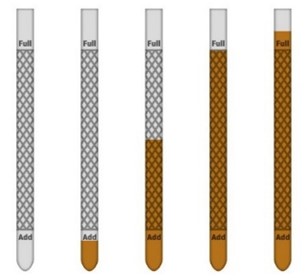
Oil is the lifeblood of the engine in your vehicle. It lubricates the engine and protects against the two biggest enemies of any motor – friction and heat. The dipstick indicates the oil level in your engine, whether it be with two pinholes, the letters L and H (low and high), the words MIN/ADD and MAX/FULL, or simply an area of crosshatching. If the top of the oil streak is between the two marks or within the crosshatched area, the level is fine.
It is a well known fact that too little oil in the crankcase can lead to oil starvation and result in engine damage and possibly complete engine failure. Is more oil therefore always better? Correct? Wrong! If you drive your vehicle with the engine overfilled with oil, it is asking for trouble. Here is why:
Aerated Oil: When there is too much oil in the engine, the rotating crankshaft whips the oil up and mixes air into it. This causes the oil to be bubbly or frothy and the oil pump pickup-tube draws up aerated oil. Think of it as your engine turning cream into whipped cream. No one wants whipped oil lubricating their engine. The result is normally low oil pressure – ironic, isn’t it?
Engine Oil Leaks: Too much oil can create excessive pressures inside the engine that will look for an escape – usually through gaskets and seals. Head gaskets, crankshaft oil seals and valve cover gaskets are normally the first to fail. This will lead to oil leaks and costly repairs. Furthermore, if the oil seal on the flywheel end of the crankshaft goes, the oil can contaminate and damage the clutch.
Blue Exhaust Smoke: When the crankshaft rotates in the engine oil, it splashes more than normal oil up into the cylinders. Some of the excessive oil ends up in the combustion chambers where it mixes with the fuel. Since the oil is heavier than the atomised fuel it fails to burn completely and goes out the exhaust as foul-smelling blue smoke.
Damaged Catalytic Converter: The oily exhaust gases also coat the inside of the catalytic converter. When this happens, it is only a matter of time before the oil clogs the converter completely, causing it to overheat and fail.
Spark plug fouling – Excess oil in the combustion chamber may well foul up spark plugs, which will then need to be replaced.
Serious Engine Damage: Too much oil can create resistance against moving parts, such as pistons and connecting rods. Excessive resistance will result in catastrophic engine failure, often beyond repair, and the engine will need to be replaced.
The moral of the story is too much oil can damage your engine. If you notice the oil level is too high, have some of it removed straight away to prevent these serious problems from occurring.
To find out more about the complete Blue Chip grease portfolio phone 011 462 1829, email us at info@bcl.co.za or visit www.bcl.co.za
